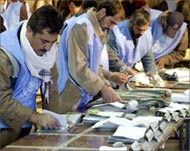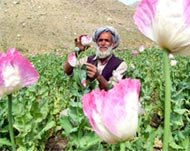Date set for Afghan parliamentary poll
A joint Afghan-UN election commission has proposed postponing by six months Afghanistan’s already long-delayed parliamentary polls until mid-September, its chairman says.

The polls were supposed to have been held in tandem with last year’s presidential vote won by US-backed incumbent Hamid Karzai, which was itself repeatedly delayed amid concerns about security and logistical problems before taking place on 9 October.
“We suggest that the parliamentary election should be delayed for another six months. It means that the parliamentary election should be held in the third week of Sunbula,” Bismillah Bismil, chairman of the Joint Electoral Management Body (JEMB) said on Tuesday, referring to mid-September on the Afghan calendar.
The JEMB, which met political parties on Tuesday, will have to get the parties’ blessing and will also need to consult donor countries funding the elections.
Parliamentary approval
Karzai, installed as transitional leader after US-led forces overthrew the Taliban in late 2001, does not have a political party, but his cabinet will need the approval of the new parliament to keep their jobs.
 |
|
The parliamentary elections are |
More than 10.5 million people will be able to vote in the election for a 249-seat lower house of parliament and provincial councils, and there will be a chance for new voters to add their names to the voter register.
Officials have said district council elections supposed to be held at the same time might not be possible this year, unless disputes over electoral boundaries are resolved.
Delay in the district polls would mean it would not be possible immediately to create a full-sized upper house, or Senate, since district councils are supposed to send representatives to the chamber.
Fifty political parties, many of them run by former mujahidin who fought the Soviets and the Taliban, have so far registered to contest the polls.
Some, including a new party formed by the runner-up in the presidential election, Yunus Qanuni, have still to complete the process.
Complex elections
These elections will be more complex than the presidential election, as the commission will probably have to deal directly with several thousand candidates, said Julian Type, from the commission’s operational planning unit.
|
“There will have to be a robust [security] presence in all 34 provinces” Julian Type, |
Security will be a big issue, even though the Taliban failed to mount any serious attacks during last October’s election and nearly all the heavy weapons in the country have been rounded up under a disarmament programme, and around three-quarters of the private militias have been disbanded.
“There will have to be a robust [security] presence in all 34 provinces,” Type said.
Two priorities for the commission will be to properly train the large numbers of electoral workers needed, and the establishment of a strong and transparent mechanism for dealing with complaints.
It will also take steps to ensure there is no repeat of the mix-up over pens used in polling stations.
In October, many election workers mistakenly used an ordinary pen to mark the hands of people who had voted rather than an indelible ink pen meant to prevent multiple voting.
Foreign support
Meanwhile, Canada will give $5 million to a programme designed to rebuild a judiciary system in Afghanistan, the International Law Development Organisation said on Monday.
 |
|
Afghanistan is the world’s |
Iran has also offered Afghanistan support on Monday in fighting drug traffickers by training Afghan border police, tightening borders and sharing intelligence.
Afghanistan has become the world’s number one producer of opium in just over three years since the fall of the Taliban.
Afghan Interior Minister Ali Ahmad Jalali said Iran had begun building border checkpoints for the Afghan authorities and training guards to man them last year, and the two sides signed a new accord on Monday covering some of the same ground.
The US has earmarked $700 million to fight drugs in Afghanistan, and Britain is to spend $100 million while trying to raise a further $300 million from smaller countries.